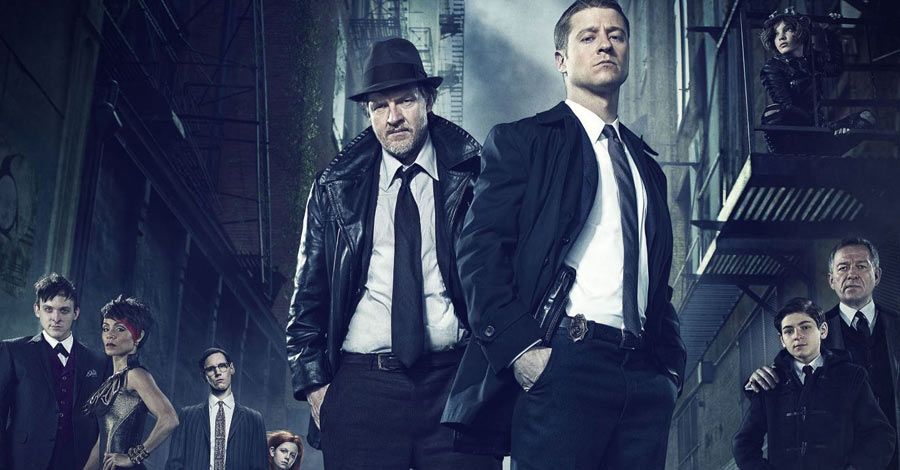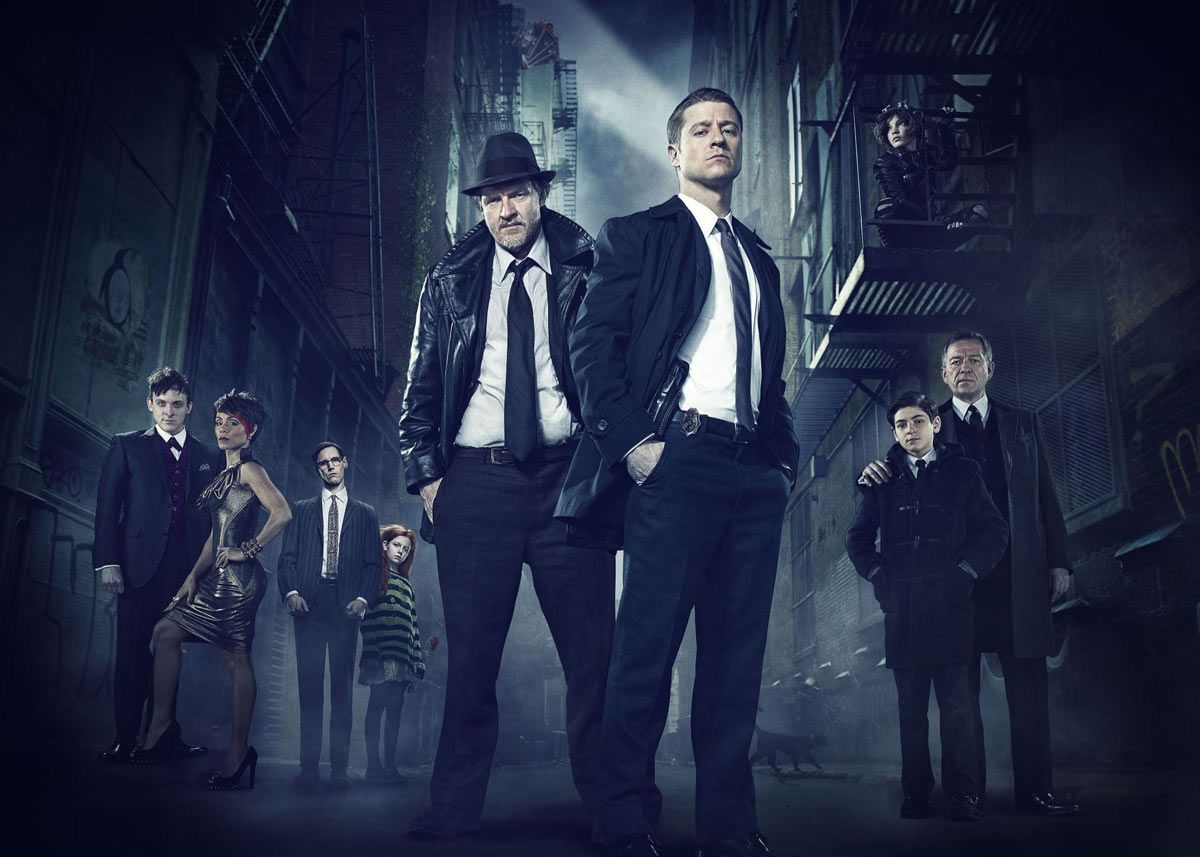It's no small challenge to ask audiences to throw out everything they think they know about a character as iconic as Batman, but "Gotham" executive producers Bruno Heller and Danny Cannon are ready to re-interpret the Dark Knight's backstory in bold new ways.
The pilot of the new series, which debuts this fall on Fox, was screened for a select group of press June 12, the first taste of what the two show business veterans have planned for the classic characters. Batman's origin story has been routinely tweaked, evolved, rebooted and revamped to suit changing tastes, times and creative inspiration since shortly after the character first appeared in 1939, but Heller -- who previously conceived such admired television programs as "Rome" and "The Mentalist" -- and Cannon -- a journeyman director/producer with a plethora of credits across the "CSI" franchise as well as regularly helming pilots and episodes of recent series including "Nikita," "The Tomorrow People" and "Alcatraz" -- are taking the character down to his ground zero by launching the series with the murder of Bruce Wayne's parents and following the ongoing corruption of Gotham City, largely through the eyes of young war veteran-turned-idealistic detective James Gordon (Ben McKenzie).
RELATED: Logue Reveals "Gotham's" Harvey Bullock Will Walk a Moral 'Razor's Edge'
After the screening of the pilot, Heller and Cannon joined Comic Book Resources for a face-to-face chat about their vision for the series, which finds inspiration in a multitude of stories from comics, TV and film, yet promises to stand distinctly as its own unique take on the Batman mythos.
Comic Book Resources: What got you excited about "Gotham" overall, on a conceptual level? Even after 75 years of Batman stories, this remains such fertile ground.
Bruno Heller: Telling origin stories, essentially, always seems to me the most fun and the best part of the myth -- not just comic superhero myths, but Hercules, Achilles, Rudyard Kipling. How things got to be the way they are has always been my favorite part of these stories, so this was just a natural start with the founding myth, but finding a different angle on it. And then, basically, Danny took it from there, because he had a fully realized vision of this world that just -- well, you saw it. I think what he did, it's made it a three-dimensional world that nobody else has done with this story.
Danny, talk about visually, stylistically building that world. What did you want to do to make it its own thing?
Danny Cannon: Well, I think that one of the key words that Bruno said in our first meeting was, it doesn't matter when the time is, and I ran with it. My idea of Gotham 20 years before Batman was a New York without hope, a New York that didn't get gentrified, that didn't get Koch and Giuliani and Bloomberg. Instead, it got corrupt people and the trains stayed graffitied and gangs took over and the cops became corrupt.
Heller: But then, also, it was the most beautiful and sexy and glamorous period in New York history. It was bleak and dark and horrible, but you desperately wanted to be there.
Cannon: After that first meeting, I watched "Serpico." I watched "French Connection." I watched "The Warriors." And then I watched "Hudsucker Proxy." I watched films that were nondescript times that were inspirational because they were places I wanted to go. There was a romanticism to them, and those were my key worlds.
There was some great cherry-picking of characters, names, references, concepts and story fodder from the comics, but also it's pretty clear that this series is poised to be its own thing. Tell me about the balance you hope to strike as the show moves forward.
Heller: Yeah, the fact that Batman lives in kind of two different worlds culturally, i.e., people who are immense fanboys and a much larger public are aware of it, then we do have a dual responsibility. But from my perspective, it's a blessing because it means that you can -- and I hope we can, anyway -- lay in deep stuff for the fans that get it that doesn't bump for people who are simply just watching the show. For me, you have to be able to watch the show, even if you don't know who Batman is. This is a story about the people. And so as long as we can do that, as long as we're honoring the story we're telling you at the moment, then to a degree, everything else takes care of itself. Everything else is a huge bonus. It's like working with movie stars -- as any director or writer will tell you, as soon as you're working with people that other people feel they know and understand, you're already bigger than life. Your story immediately, if you're telling it right, has that same kind of mythic, iconic feel to it, and that's the beauty of this world. That's what Danny did so brilliantly, I think, because they're both entirely real worlds, but it pays complete respect to the fact that that's an iconic, mythically dream world at the same time.
Cannon: I liken the Batman franchise to a great band, like the Beatles or the Stones. They have great songs, and it's all about how you play them.
Tell me about the story architecture you have planned for the season as a whole. Is the big picture extremely thought out, or are you leaving yourself lots of creative wiggle room as the story unfolds?
Cannon: I find when you go to series -- I've done both. I've done a lot of leeway, and then I've done none. I actually find that it's better as a dictatorship rather than saying interpret it yourself. What I do is empower directors within that world to kick my ass -- that's their job. The director that comes after me, I want him to embarrass me. And I want to go back to work the next day going, 'I've got to fucking learn this all over again.' But the world that we live in is specific. I can tell you what's down what street, what's on the walls, what graffiti is there, what cars they drive, what music's playing on the background. And I think when you have a series to deliver, that's the kind of detail -- people rely on that detail. They need to trust the showrunners.
Heller: Similarly, with the plotting of it, you can't be -- if the plot isn't in firm, being carried like the Olympic torch, then your audience starts getting the impression that you can kind of make it up as you go along. You kind of have to give the sense that a storyteller is telling that story -- it's not just shit that's happening. Because otherwise, you don't get that, and, again, that's what he does so well. And also, technically, when it's this elaborate, you need to be able to tell actors, yeah, you're going to be in X-O-17 direct, and within that, you want to be able to actually on-set stage, once everyone understands what they're doing, if you're doing it that systematically and everyone feels free in the moment to do what seems right. So the actors can feel they know what the purpose of the scene is, then they can improvise inside that.
In the pilot, we see glimpses of characters who, we sort of know what their future's going to be -- the early incarnations of the Penguin, the Riddler, Catwoman and Poison Ivy. Are these the central villains from the Batman universe that we're going to focus on for Season One, or are there going to be additional proto-villains as well, as the first season rolls along?
Heller: We'll see how it plays. That's the beauty of TV: it's much more like theater. You get to adjust. We've got people in the hopper to go to, but the intention would be to play a long game here.


